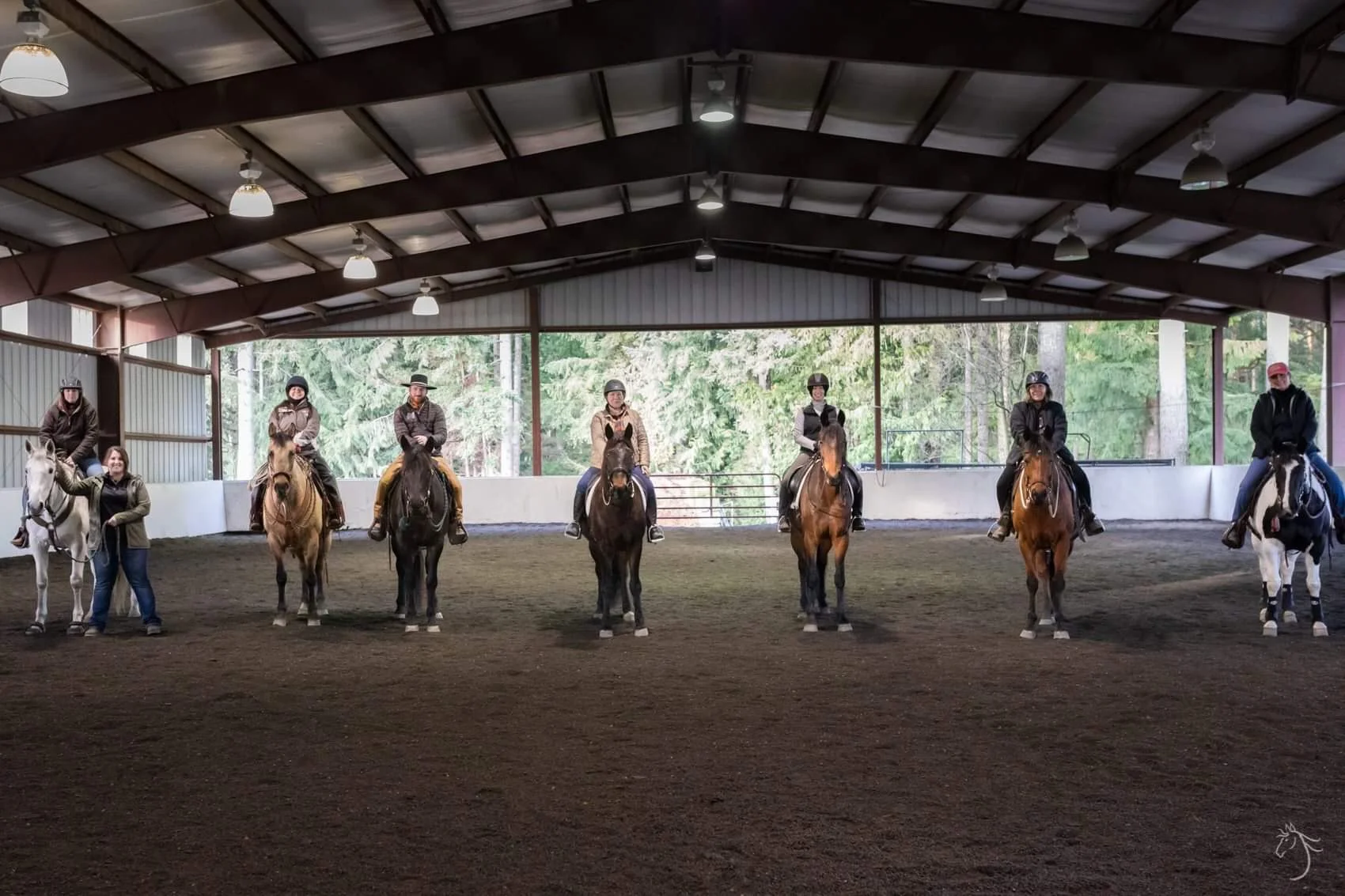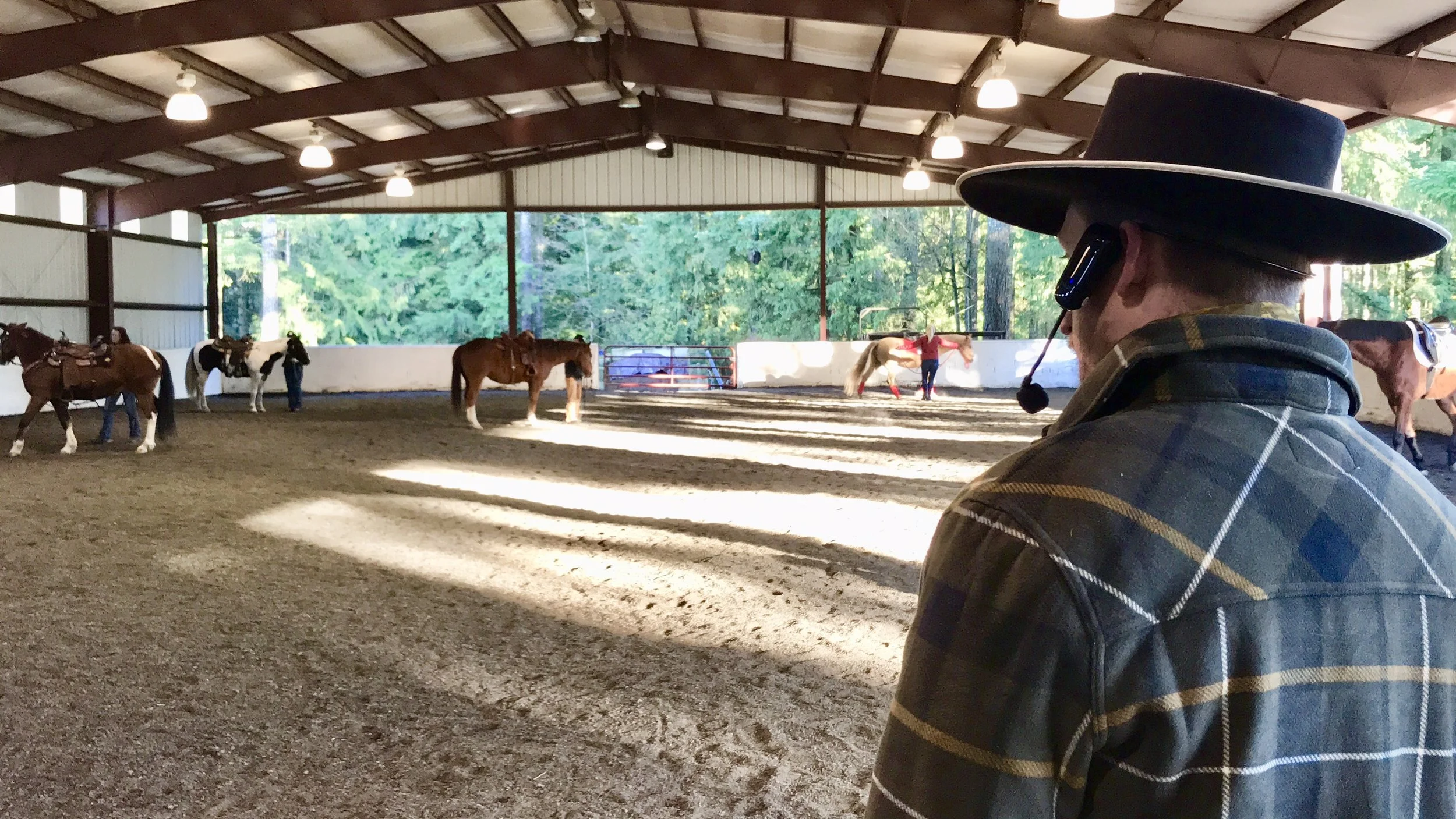Foundation Before Specialization
Evan's clinics focus on working the inside of the horse...not the outside. Evan believes in Foundation before Specialization. Many people identify their riding style with a specific discipline or sport. Evan teaches people how to become "horsemen" before they become "sportsmen". Evan believes in order to develop the best horses, we must focus on the "all-around-ness" of the equine sports. Build a good cake (foundation), then think about how good the icing can be. Think of it as having a wide-angle lens on a camera. For example, Working Equitation, Extreme Cowboy Race and Versatility Ranch Horse are "all-around" competitions.
Evan's clinics take the most valuable aspects of many different horsemanship disciplines and endeavors to create a foundation for all horses. They are designed to teach you why we focus on the foundation and how it is connected to sports and purpose.
What can Evan's clinics do for you?
Evan's classes help both the horses and their owners: learn to be safer through skill and understanding; gain confidence through exposure and experience; and become successful through principle and purpose. It's all about learning the formula for success: Ambition, Principles, Patience and Sequence. Horsemanship is easy... it's all about getting the horse to want to be with you... whether you're on the ground or on their back.
We want all of our horses to have the following qualities:
Confidence: We need to get relaxation without dullness.
Responsiveness: We need our horse to be sensitive without getting upset or mad.
Reasoning: When our horses can become puzzle solvers.
Bravery: Teach your horse to follow our lead through the most adverse situations.
Exuberance: Your horse will run faster and jump higher out of heart and desire.
In order to have a great foundation, we need to develop the horse in the following areas:
Bonding, obedience and yielding exercises that we teach on the ground
Arena exercises
Outside living and outside riding
Purpose
THREE THINGS THAT EVERY HORSE NEEDS:
1. Confidence: Our job is to help horses be more confident through exposure and experience (horses are naturally skeptical of people, places, changes and things). We use rhythm, relaxation and retreat to develop confidence with and for the horse, not to the horse.
2. Yielding: From/to steady pressure. There are yields from the halter, yields from the bit, yields from our legs/spur and yields from the stick/flag. The measure of respect is "appropriate response to pressure". The only way to get respect is to apply pressure appropriately. We do this by setting up boundaries - nothing bad or emotional about it, but put on pressure (as steady as a fence post) and holding the horse accountable for the boundary we set (hope is not a good strategy).
3. Purpose: We empower the skills we've taught the horse by giving it purpose. Horses often don't understand the meaning of what we are asking of them until they understand the purpose. We look for opportunities to apply what we teach them as much as possible in a way where the horse has a responsibility. When a horse learns to focus on his job, he'll be a much better partner.
WHAT TYPES OF CLASSES ARE OFFERED?
Evan offers many different types of classes and skill levels ranging from beginner level all the way to people who want to train or compete. Evan's clinics combine many different disciplines and sports together to give you the best all around abilities you can have.
Colt Starting / Pre-Ride Training
Creating the perfect Foundation from the start
Time Frame: 4 days/3 hours each day. Class limit: 6 Cost
We take the time it takes to properly halter break young horses. The goal is to make the first ride as smooth as if it were the 1000th. Participants will work on getting their horses used to being touched all over their body and preparing their horses for being saddled and ridden for the first time. All the ground work will be intended to prepare the horse by learning what to do when he is afraid, as well as simulating what he'll be experiencing when he sees you on his back. Long gone are the days of breaking horses by bucking them out.
This type of work can then be applied to any horse young or old. If you are new to horses, this is the perfect class to start from scratch and build a lasting foundation with your horse. Have a troubled or bothered horse? Put him through this class and restart your horse's in a positive, progressive and natural way.
Subjects Include:
The Colt-Starting Skeleton
Accept the Human (As a friend and a leader)
Accept the Saddle/Cinch (Placement and wearing it)
Accept the Rider (As a passenger and then a guider)
Accept the Bit (Placement and communication)
Confidence and Respect
Haltering
Teaching yielding and "response with respect"
Mounting bareback
Saddling technique
Driving with one rein
Mounting safely
Being a great passenger
Control with one rein
Handling the feet
Preparation for tying
First bit contact
Foundation Horsemanship
Essential Skills and Safety on the Ground and in the Saddle
Time Frame: 1-3 days/6 hours each day.
This class is all about building a language with the horse starting on the ground while staying safe. You will gain the sense that you can effectively move your horse out of your personal space - an essential part of safe horsemanship. You will learn how to prepare a horse so they are calm and responsive with simple drills to keep you safe.
In this class you will learn fundamental groundwork exercises. Once you learn these exercises you'll be introduced to some essential horsemanship patterns, which help engage your horse mentally, emotionally and physically while also setting you up for more advanced applications when you go more in depth in your horsemanship.
Ground subjects
Learn alternatives to longeing
Rope handling skills
Escalation of Aid
Using a flag
Getting response with respect
How to lead properly
Yield backwards/away from you
Teaching the leg cues
The power of "suggestion"
Develop more creativity and purpose in your training sessions
Learn how to use simulations to develop skills before teaching your horse.
mounted subjects:
What every rider should know about staying safe in the saddle
How a few minutes of prep can save you a trip to the hospital
How to prepare a horse without boring him with repetition
A Ten-Point "Pre-Ride Checklist" that has a history of proven performance
How to assess if your horse looks rideable
How to mount and dismount safely
How to get your horses permission to ride them
Basic equitation technique that every rider should know for balance and safety
Horsemanship 1 - Beyond the Basics
Confidence and Impulsion in the Saddle
Time Frame: 1-3 days/6 hours each day.
Some horses have more go than whoa or vise versa. This doesn't have to be frustrating for you. This class is about the secrets of gaining impulsion with your horse.
The ground objective in this class is about about teaching your horse how to be a willing partner. You will improve your connection and respect at greater distances as well as incorporate more obstacles and tools using much less pressure.
You will work on helping your horse to get his emotions under control, while continuing to develop your skills and knowledge. You tool bag will grow as will your confidence as a rider.
General topics iNCLUDE:
How to use psychology to motivate a lazy horse and calm an impulsive horse
Why harsh bits and tie-downs, whips and spurs don't get to the horses' mind
"Working from where the horse is at"
What to do when you're mad or frustrated.
How to use principles of effective leadership
How to use strategies on the ground and while riding
How to maintain continual improvement
ground skills:
Philosophy of longer lines
Backwards & over exercise
Backing in/out of a gate/stall
Sideways in a circle
Higher precision
Developing flow
Mounted Subjects:
Active and inactive reins
Indirect and direct reins
Leg/Seat Positions
Guiding with your legs (round turns & square turns)
Control with one rein
Controlled catastrophes
Developing Impulsion (Whoa = Go)
Becoming a good passenger
Getting a "Soft-Feel"
Improving Straightness
Casual, light touch and concentrated rein positions
Teaching circles
Introducing lateral work
Introducing open areas and trails
Natural and artificial obstacles
What are people saying about Evan's clinics?
"Evan is calm and consistent in his horsemanship. He made sure to address my concerns with my horse and provide resources going forward. I appreciate the level of care my horse received as well." - Julie Goodrich, Vancouver Washington
"I first saw Evan in 2008 at a demonstration he was giving. He was riding bareback and bridleless. I knew at that moment he had a big future ahead of him. I have had the opportunity to see him work several times sense then, and I'm always pleased, inspired, and learn a lot. I am very particular in who works with my horses, as I have my own thoughts and ideas. Evan has always been respectful of my opinion. He treats me like a fellow horsemen, even though we both know I have a lot to learn. Evan has worked with 2 of my horses, a Arab gelding, and a kiger mustang mare. Both of these breeds require a soft hand. He was gentile yet assertive. He gets more done on the first ride then most do in a month. Time with Evan is money well spent. I am very excited to work with him in the future." - Brenda Porter, Port Orchard Washington
How to host a clinic with Evan
Contact Evan with your requested date for a clinic. If that day is available, you can try to get your clinic filled. Your clinic would be considered "Tentative" at this point. As soon as your clinic meets the necessary minimum size, you will e-mail Evan again and we will consider the clinic dates “Official.” We strongly recommend that you request clinic payments in full from your riders at the time of booking their riding spot. It might be helpful to your riders for you not to cash their checks until just after the clinic. You can keep the clinic in “Tentative Status” until one month before your clinic dates or until another clinic host requests the same dates.









